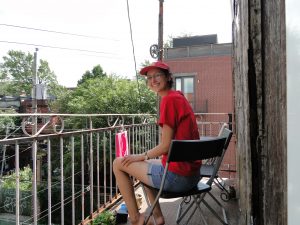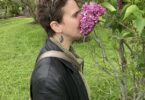Aris Keshav
Lines of sun-bright lesbians
perched in café windows
follow me with glint-glint eyes
making smooth supervision
of Saint-Viateur. I bask
then traipse the corner,
waverly with happiness.
Here are black-pants men
all elegance as they maneuver
violin cases from a pick-up truck
(everything is performance)
& I let out a long-breath fuuuuck…
The next morning at the bus stop
I discreetly roll up my
pant cuffs hoping to become
incredible by association.
Last year I couldn’t wear any dresses
and this is what I told my mother
when she called to ask about
my new Facebook name.
Some Tuesdays are for coming out I guess
so I made time for weeping, good questions
& bad advice (but I’m as lost as you are)
between homework and dinner.
Now I long to fringe my every edge
in glitter, gold, and river ripple silk,
wrap my pointy curvy body
in all the fairy lights of Saint-Laurent
with an urge like my need
to decorate the city:
does this make me
past tense trans?
Am I finally a ‘they/them’?
Have I earned it?
Have I earned it?
And if I hadn’t moved to Montreal.
Layers of art, or is it artifice.
I think I dress differently
since I got here, I confess one morning,
leaping sidewalks with my velvet amie,
both of us embroidered tête to toe.
We walked out of the closet &
into the sun. The sun! The sun!
All caps SUMMER
and the multiplied desire
to sex, to excess, to drip in ornamentation.
O city, lover, surround me as I surround you.
I am inclined to find poetry everywhere.
Text on the street hinting at
intention, arrangement, purpose.
Words in windows, ambiguous
billboards, text messages
murmuring: more, more.
What can I possess by seeing?
What is mine (not yet art)
and not mine (“art”-labelled)
to possess, smother, document?
Alternations inside me from
outside me or inside me
and inside me and outside me
and this blur develops which
brightens, snags the light, holds it.
 Aris Keshav (b. 1996) grew up in Ontario, grew up some more in Montreal, and is now working on a PhD in linguistics at UC Santa Barbara, California. They’re currently studying the sociophonetics of how people perform gender in social interactions. So far, little is statistically significant, but there is always hope. Their poetry has appeared in The New Quarterly.
Aris Keshav (b. 1996) grew up in Ontario, grew up some more in Montreal, and is now working on a PhD in linguistics at UC Santa Barbara, California. They’re currently studying the sociophonetics of how people perform gender in social interactions. So far, little is statistically significant, but there is always hope. Their poetry has appeared in The New Quarterly.






